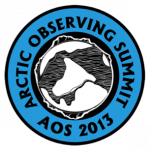
The Arctic Observing Summit (AOS) is a high-level summit that aims to provide community-driven and science-based guidance for the design, implementation, coordination, and operation of an international network of arctic observing systems to be sustained over several decades. AOS is led by the International Study of Arctic Change (ISAC) as part of the implementation of the observing change component of the ISAC Science Plan. AOS 2013, scheduled to convene 30 April - 2 May 2013 in Vancouver, Canada, is the first in a planned series of biennial summits. AOS 2013 registration is now open.
AOS is organized as an international forum to address urgent needs of arctic observing activities across all components of the arctic system, including the human component. It will foster international communication and coordination of long-term observations aimed at improving understanding and responding to system-scale arctic change. The summit will provide a platform for optimizing resource allocation through coordination and exchange among researchers, funding agencies, arctic residents, and others involved or interested in long-term observing activities, while minimizing duplication and gaps. The AOS 2013 schedule allows for side-meetings to advance planning, coordination, and integration of activities. Products from the summit will be prepared for an audience that includes arctic communities, governmental decision-makers, the research community, the private sector, and the general public.
AOS 2013 Themes
Status of the current observing system including its objectives, capabilities, challenges, and sustainability.
Observing system design and coordination including integration of components and implementation.
Stakeholder perspectives on observing system design and integration.
Mechanisms for coordination of support, implementation and operation of a sustained arctic observing system.
To capture consensus on arctic observing needs and articulate critical issues AOS 2013 organizers solicited white papers and short contributions from the community and encouraged contributors to address broad underlying questions such as:
What can be done to improve the design, implementation, coordination and sustained long-term operation of arctic observing systems in the focus area of a given white paper?
Are arctic observations relevant to the theme of a given white paper shared optimally today among communities such as scientists, governments, and stakeholders?
Are there specific restrictions to collecting or sharing arctic observations imposed by military strategic reasons or natural resource protection, for example?
The white papers also provide a mechanism through which stakeholders, beyond the AOS 2013 participants, can shape the 2013 summit and its outcomes and guide the focus of future summits. AOS 2013 white papers and short contributions are available for comment on the AOS 2013 website.
AOS 2013 organizers invite poster contributions to highlight recent research and activity results relevant to arctic observing. The poster session at the AOS 2013 will provide an opportunity for summit participants to present new and innovative work-in-progress and enable discussion in an informal setting. Poster abstracts will be published and, with author permission, posters will be made available as part of the AOS proceedings following the summit.
The website also features a community input survey, the results of which will help to shape this and future summits.
AOS is a task of the Arctic Council's Sustaining Arctic Observing Networks (SAON) initiative. It is part of the broader SAON implementation process, which is jointly led by the Arctic Council, International Arctic Science Committee (IASC), and the World Meteorological Association (WMO). AOS 2013 partners include: the U.S. interagency program Study of Environmental Arctic Change (SEARCH), the ArcticNet Network of Centres of Excellence Canada (ArcticNet), the European Union's Arctic Climate Change Economy and Society project (ACCESS), the International Network for Terrestrial Research and Monitoring in the Arctic (INTERACT), the Swedish Polar Research Secretariat (SPRS), and the International Arctic Research Center (IARC).
For more information, see the AOS 2013 website, or contact the Arctic Observing Summit organizers (AOS [at] arcticchange.org) or Maribeth S. Murray (murray [at] arcticchange.org).
